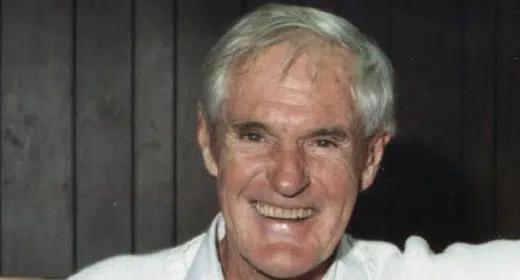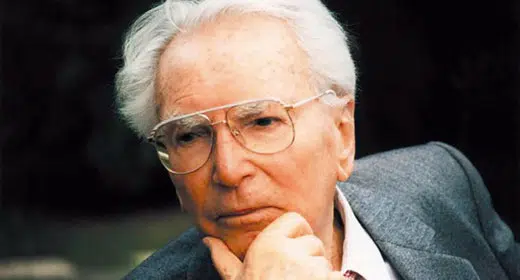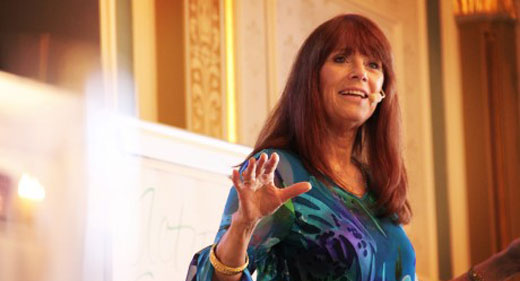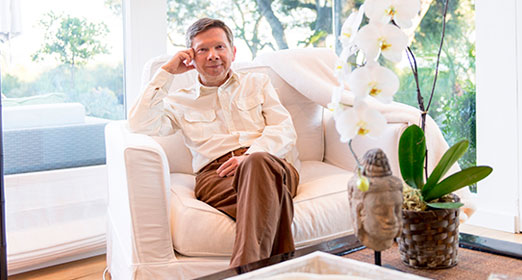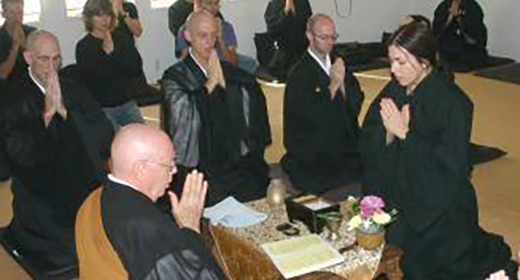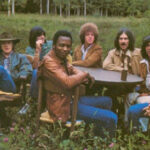Jordan Gruber conducted this interview with Jean Houston on January 22, 1996. The interview took place at the Fairmont hotel, located in San Francisco’s Nob Hill district.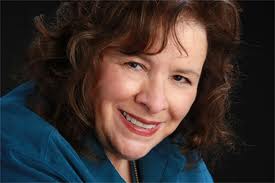 Americans As Spiritual Practitioners
Americans As Spiritual Practitioners
e.com: What we’d like to know, from your experience, is how do you figure out … how does a person figure out what is likely to work for them from this vast set of choices, and when they do figure out what works for them, how do they really get themselves to practice it consistently?
Jean Houston: Interesting question. I’ve never been asked that before. I certainly am very familiar with the phenomenon and one of the things you find is that with Americans they sometimes get into a single practice, let’s say Zen Buddhism or Tibetan Buddhism, and they stay with it for a while, but then the lure of the next practice is always there on the American scene to a degree that you don’t find in other countries, or even other cultures.
We are not a single track society, probably because we began as a multicultural society, with a kind of multiculturalism of pursuit of physical, personal, and spiritual enlightenment. And being a fix-it society too [laughter] we are always looking for what is a bigger and better fix. And of course what happens is that you have a lot of people who, after ten years or twelve years, seem to know five or six practices pretty well. I don’t necessarily think that is a bad thing.
I think that what has happened in America is that America is the place of the hardest of the world’s physical, mental, psychological, spiritual, and electronic technologies. This is the techno-society, more so, I think, than any society that has ever been. Never before have we had access to so many different styles and ways of being, knowing, having, transforming. We’re the ones who really are kind of an experimental lab — we’re what is called the “skunk works” — where all the experiments are being made.
The problem is that it keeps you in a state of yearning all the time, because your adrenaline is always tripped ready for the next trip, as it were.
e.com: Are people missing the deeper value of having just one practice?
Jean Houston: I don’t know. Some people are not. Some people’s way is the way of the journey.
For example, if you look at the classic Sufi way, “Well, you want enlightenment, then go to Ali who sells shoes in the south of Morocco in the market.” And Ali says, “Heck, I don’t know anything about enlightenment, I know about shoes. Here, you want to learn about shoes? Let’s learn about shoes.” And then after about six months Ali begins to drop pearls of wisdom. Then you’re with Ali for two years, and Ali says, “OK, I want you to go to Mohammed, in Cordoba, a maker of fine swords.” (This is the 13th century.) And you go there, and he says, “I don’t know anything about enlightenment, I know about swords.” And before you know it you’ve had maybe six or seven extraordinary teachers.
The way of spirit has often been the way of the journey — of the hero or heroine’s journey. Because different people can clearly give you different paths. You have very complex paths like Tibetan Buddhism, and if you stay within it there are an infinite number of resources because it’s been around for so long, as with many of the Eastern disciplines. The paradigmatic story here is the story of the Buddha, isn’t it? For six years he went from place to place to place. He was like a typical American.
e.com: He tried it all.
Jean Houston: He tried it all, and then he said, “To hell with it. I’m just going to sit here until it comes.” So I think the issue is to look at the story of the Buddha, and look what he did, he did something right, he did try it all. He certainly acquired the immensity of the knowledge and the technique and the practices of his time of 6th century BC in which you had a kind of extraordinary multicultural uprising.
Now & Then: Two Colossal Spiritually Ecumenical Times
Jean Houston: . . . 600 BC, you know, is the great century all over the world. Everywhere. Buddha, Lao-tzu, Maitreya, probably Zoroaster, some version of Quetzalcoatl, perhaps, Pythagoras, and some of the very early Greek Philosophers, and then there are all kinds of legends, the great Bard of Ireland … it was a worldwide time of a kind of seismic search for the soul.
Now, we’re in a similar time, and what is rising up is not great political leaders or economic leaders, but instead we do have the incipient rise of spiritual, or psycho-spiritual, or psycho-physical teachers, and that is a world-wide phenomenon. We’re almost back in the 6th century. It’s just that people are not coming in as singular entities or messiahs and when they do, they’re shot down but as people who are evocators of a much larger process. As I often say, “guru” is spelled “gee you are you.”
There are a lot of gurus too. But this is the time of people claiming the fact of . . . being avatars, meaning, the latest focalization of the God-stuff incarnate, but this time it being a democratic process. So in the course of our democracy we are, in a sense, recapitulating what probably happened in the 6th century BC, but only now we have access to many different modes of knowing.
Now that’s what Buddha did. He harvested the modes of knowing of his colossal spiritually ecumenical time, which is the 6th century, and then what he did was he took it in and released it. And of course that’s the nature of the mystical experience. You go through the via positiva and acquire an enormous array of techniques and knowing, and then you go into the via negativa [laughter] so you release it, but it’s still there as codings; if you look at the Buddha’s practice which came out of his teachings, it’s very complex, and certainly began in his time.
Picking and Choosing:
Some Of the Best Teachers Don’t Write the Best Copy and Vice-Versa
e.com: So people have to practice something . . .
Jean Houston: Oh they have to practice something … because we must, as Bergson said [first in French] “remount the slope of thought” … and part of human evolution and human becoming is doing just that, remounting the slope of thought. That’s our next stage.
e.com: There are an enormous number of catalogs, an enormous range of choices of different seminars and workshops and teachers and all these things …
Jean Houston: Not available 20 or 30 years ago.
e.com: How does someone deal with that when they get it? How do you figure out . . .
Jean Houston: You open up to a page, like the Bible, and you just point. (Laughter.)
e.com: Is that your method?
Jean Houston: I don’t know, but I just thought of that. That’s not a bad idea. I think you just go through and you realize that some of the best teachers do not write the best copy. You almost have to just go, intuitively, and just sort of ask your deep self, your high self, your entelechy, to find a way, and don’t look at it in terms of copy. You have a group of people out there who acquire an armamentarium of techniques and they can persuade an awful lot of people with techniques but who are really essentially still part of a kind of a greed mentality.
e.com: Old paradigm.
Jean Houston: Very old paradigm, in using just surface techniques, but no depth. And with technique you can persuade for a small period of time, and you can certainly make money. And that of course is also the American way, the technique-ology, but without the art, without the art and spirit that’s really behind it.
The Magic of Computers
e.com: How can computers and the web possibly be used to help people figure out what would work for them and do all these things that we’re interested in. I know that you have some strong feelings about computers.
Jean Houston: Yes, I’m very pro-computer.
e.com: You wrote, “As I have been greatly enamored of computers since the 1970s and have a near-religious belief in their efficacy . . . ”
Jean Houston: Absolutely.
e.com: ” and magic.”
Jean Houston: (Laughter) Well that’s me being whimsical, of course, a lot of my writing is whimsical. But I happen to love computers. For me they have worked beautifully, and have greatly increased my productivity, and the fact that I’m able to on my little computer a little Powerbook 170 over there that still remains the Stanley Steamer, the best, because it never breaks down.
e.com: You’re not afraid of the view that people like Gerry Mander has, who wrote In The Absence of the Sacred, that although we think we’re doing such great things with computers — we’re balancing checkbooks, we’re writing proposals — but in reality the military, and the government, and the corporations are making use of computers way beyond what we think, and computers have a telos and an entelechy that is not about helping human beings. And you look at Csikszentmihalyi’s work on memes, and he talks about computers really evolving aside from human intention, and are we maybe just getting sucked in a way that we don’t think of?
Jean Houston: You must also talk about all the kids who are out there, and essentially regard computes as prosthetic extensions of themselves. These kids have very subtle and complex forms of interaction with computers. Everything he [Csikszentmihalyi] is saying is true, but I think there is also a third form he is not looking at which is the fact that evolution or culture seems to evolve its own aesthetic and prosthetic extensions. This is another form of media, and it is probably mediating our minds and bodies at the same time.
They’re not going to go away. And a lot of these kids are becoming enormously sophisticated in ways that are not unlike what the military is doing. You grow up with it and it seems to bring on its own morphic field, a gestalt of knowledge and ways of working.
e.com: If you go to an arcade today you see the old-style pinball machines .
Jean Houston: Or the virtual reality machines
e.com: Or they have these theater games where people sit down in front of these large screens and it’s not that far from the full-fledged versions of virtual reality . . .
Jean Houston: And virtual reality in some form or other is just around the corner. But I also believe, since my field has been human potential development, that whenever you get a high tech you also have a high touch. For example, I find that my own work in interior landscapes, the vast treasurehouse of the human psyche, the virtual realties within, has enormously increased since I’ve had computers, and it’s also inspired me in ways I never would have thought of before because I have a kind of analog in the external world for what I really believe, if you will, the treasure troves of modes of knowing and knowledge within, and I sometimes even use that metaphor to tap into interior things.
But that’s me. I’m not trying to make a position. But I do believe that, for example, on the Internet and I’m on the net whenever I can be I see people taking on these archetypal identities. “Eagle woman, the fourth fat-free Flannigan.” And with these archetypical identities, they are also taking on ways of knowing. It’s almost like the old Clark Kent in the phone booth, or Captain Marvel and Shazam! And they take on all kinds of they get a kind of passion for the possible that their little local lives do not permit.
I have a friend who’s 14, I guess she just turned 15, and she’s in New Hampshire, and she takes on a name that seems to deal with the oceans I’m sworn to secrecy as to who she is . . . and she’s this little girl, and she has decided to be a kind of one woman repository of information to save the oceans, and she’s doing incredible things. And no one knows she’s 14.
e.com: They think she’s 35.
Jean Houston: Remember in Ender’s Game [An award winning science fiction novel by Orson Scott Card.]
e.com: I was just thinking of Ender’s Game!
Jean Houston: Where the kids take on mythic identities by writing these extraordinary pieces.
e.com: Like great Greek orators.
Jean Houston: Well we’re not far off from that. Now the thing is, there is something I talk about the zeit getting geisty, but one of the places where the zeit is getting its geist is in the Internet because you have a kind of communication system. Teilhard [de Chardin]–you know about him if you read my book–was really talking about that, but he could not anticipate it because the technology wasn’t there. But the noosphere well the noosphere is almost in place, or it certainly is getting there.
Now what is trying to get there is what I think you’re trying to do, which is the way of finding some kind of spiritual sourcing. We are on the verge of a new natural philosophy, a new natural theology. It isn’t there, and you’re not going to find it in books. A natural, a *natural* theology requires a certain number of people to spontaneously combust into it. It can’t be, you know, you’re not going to have a modern Thomas Aquinas who is going to harvest all knowledge for you and then give it out. It’s not going to work that way.
e.com: But it’s going to involve elements of what we now think of as “New Age” in a pejorative sense.
Jean Houston: Possibly, and also quantum physics and biophysics. Frankly, in order to access these different kinds of knowledges in a realistic way, you almost need to get to the essence of each one, and this is something that you can find through the web. And you also find it — you find it — it’s not exactly like going to a bookstore, where you have to read. I read an awful lot, but one of the things I find is that I always have to start on page 1, and then go through “and this is why Newton was wrong,” you know, you go through until you get to the essence of it. Here you’re getting . . .
e.com: You do that so you get the context of the writer’s
Jean Houston: Yes, I try to do that; I’m good, I really do read a book from the first page. I read three to five books a week, and sometimes a lot more, because I have to stay current in a lot of fields, but I find it frankly a great deal of fun on the Internet. I never allow myself more than one hour a day because I just don’t have the time. I find I can find codings of information that people have tried to put out in succinct ways.
e.com: You can see the patterns
Jean Houston: I can see patterns of development that I can not see just in books. It’s a “both/and,” since I’ll never be a non-reader, god knows. But I feel that it’s almost as if the earth has grown herself a nervous system in us — certainly we’re either neurons or the cancer of the planet .
e.com: Depends on your point of view. Jean Houston, thank you very much for your time.
Jean Houston: You’re welcome.

